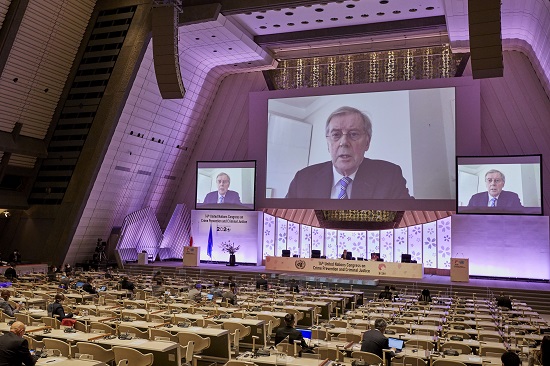
For information only - not an official document
UNIS/NAR/1434
9 March 2021
INCB President addresses 14th UN Crime Congress in Kyoto, highlighting the importance of proportionate responses to drug-related crimes and INCB efforts to address the synthetic drug epidemic
VIENNA, 9 March (United Nations Information Service) - The President of the International Narcotics Control Board (INCB), Cornelis P. de Joncheere, addressed the 14th United Nations Crime Congress in Kyoto, highlighting the work of INCB in supporting Member States in the evidence-based prevention of drug-related crime and in addressing the synthetic drug epidemic.
In his virtual address, the INCB President stated that proportionate responses to drug-related crimes are an important component of criminal justice, including rehabilitation and social reintegration, a priority topic at the Congress. In line with its responsibilities under the international drug control conventions, INCB monitors the sanctions applied to drug-related crimes and identifies and analyzes criminal justice trends and new drug-related data which may require international attention and action.
Mr. de Joncheere stressed that the drug control conventions require that criminal justice responses and drug policies respect the rule of law, due process and human rights. This includes a prohibition of arbitrary arrest and detention, the right to a fair trial, and protections against all forms of cruel and inhumane punishment. The conventions provide States with the possibility of applying alternative measures to conviction, punishment and incarceration, including education, rehabilitation or social reintegration.
INCB notes with great concern the continued reports of grave human rights violations perpetrated in the name of drug control and once again calls for a halt to extrajudicial responses to drug-related offences. INCB continues to urge all States that retain the death penalty for drug-related offences to consider abolishing such penalties and to commute sentences already handed down.
The INCB President also referred to the growing synthetic drug epidemic and highlighted the specialized tools and projects developed by INCB in response to resolutions of the United Nations General Assembly, the Commission on Narcotic Drugs, and requests by Member States:
- INCB's Global Rapid Interdiction of Dangerous Substances (GRIDS) Programme supports law enforcement capacity to detect and identify new psychoactive substances.
- Project Ion supports national authorities in preventing non-scheduled substances with little or no known medical, scientific, or industrial use from reaching user markets.
- The Global OPIOIDS Project focuses on operational partnerships to support national authorities in preventing trafficking in synthetic opioids.
- The INCB IONICS platform facilitates the secure exchange of communications among competent national authorities about suspicious incidents in real-time. This permits the development and sharing of strategic and operational intelligence to counter global trafficking in new psychoactive substances.
- INCB's Public Private Partnerships Initiative supports Member States in developing and implementing voluntary cooperation to prevent the exploitation of the private sector.
Mr. de Joncheere noted that INCB looks forward to supporting new strategies and innovative approaches that will result from the 14th UN Crime Congress to address the complex challenges of drug-related crime.
***
INCB is the independent, quasi-judicial body charged with promoting and monitoring Government compliance with the three international drug control conventions: the 1961 Single Convention on Narcotic Drugs, the 1971 Convention on Psychotropic Substances, and the 1988 Convention against Illicit Traffic in Narcotic Drugs and Psychotropic Substances. Established by the Single Convention on Narcotic Drugs of 1961, the thirteen members of the Board are elected in a personal capacity by the Economic and Social Council for terms of five years.
* *** *
For further information, please contact:
INCB Secretariat
Tel.: (+43-1) 26060-4163
Email: incb.secretariat[at]un.org
www.incb.org
